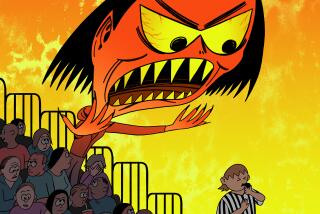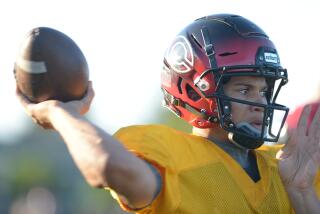KEEPING FIT : Physical Exam a Must for Child Athletes
- Share via
Sitting on the sidelines at Lions Field in Fullerton, Armando and Toni Lopez eat a picnic supper off paper plates. Somewhere in the group of miniature football players on the field is their 8-year-old son, Armando Jr., now beginning his second season of Pop Warner football. His cousin, 8-year-old Vincent Lopez, is also on the team, and his sister Jessica, 9, is practicing with the cheerleaders.
Since the day his son was born, Lopez dreamed of spending evenings this way, just as his own parents did watching him play, first in Pop Warner games, then as a high school football star. Still, he says, he wasn’t quite ready when Armando Jr., came up to him a year ago and asked if he could join a team.
“I would have preferred for him to start at 8, not 7,” Lopez says. “But he really wanted to. So we decided to let him go ahead.” Seven is the minimum age for Pop Warner, and the oldest players are 14.
Organized sports such as football or soccer can get children into a fitness habit that will last them well into adulthood, says Dr. David Simon of Western Medical Center-Anaheim, a specialist in internal medicine and family practice who performed 87 Pop Warner physicals for the Fullerton League this year.
“Childhood obesity is rampant in the United States,” Simon says. “It’s important to promote group sports, anything kids like to do, to get them out there exercising.”
Too many children, says Simon, spend their afternoons watching television or playing video games, rather than doing something physical.
But before they put on a uniform and start running around the field, all players need a thorough examination by a doctor to make sure the sport will benefit them, rather than exacerbating existing problems that may have gone unnoticed.
A heart murmur, for example, probably won’t produce any symptoms under normal conditions, he says. But during periods of high exertion, it may cause problems, reducing the heart’s ability to keep the blood flowing.
Although most of the children he examines have healthy hearts, Simon says the incidence of rheumatic heart disease and heart murmurs in children is increasing in the United States, and doctors aren’t sure why.
“The murmur is the sound of blood flowing through the heart in an unusual fashion,” Simon says. In rheumatic heart disease, the valve can be damaged by infection, causing some blood to leak from one chamber of the heart to another. And that can make a child more susceptible to infections, he says.
Hypertension, or high blood pressure, is another potential problem. “They shouldn’t be hypertensive at a young age,” Simon says. “If they are, they may have kidney or adrenal problems.” A high-fat diet may also contribute to hypertension, he says.
Simon examines each child’s musculoskeletal system to make sure he has full range of motion, examines the spine for signs of scoliosis, and checks to see if the child has a history of fractures or dislocations. A child who has had multiple fractures may have an underlying endocrinological disease that makes his bones more likely to break.
Children with allergies may suffer worse symptoms while playing on the grass, and parents and coaches need to watch out for potential problems.
Because their bodies are still growing, children are at increased risk for injuries in contact sports such as football, Simon says. Bones grow out from the middle, with growth plates known as epiphyses on either end. If an epiphysis is fractured, the result could be growth retardation or abnormal lengthening of that bone.
“All contact sports are inherently dangerous,” he says. “But with the proper use of padding, helmets, and instruction, you hope they can minimize the damage.” Even without organized sports, he points out, active children can injure themselves.
“The biggest thing in contact sports is head and neck trauma,” Simon says. “Any time a kid’s been knocked out, you need immediate evaluation, not the next night, but right away.”
Any neck injury, he says, can involve a hidden cervical fracture, which could lead to permanent paralysis if not treated properly.
If a child says he’s hurting after a long practice or an intense game, it’s up to the parent to decide whether to call a doctor or just wait it out. “It’s a difficult call,” Simon says. “If there’s a lot of pain, they should be examined right away. If it’s lesser pain, with no specific injury, it may be better to wait. But anyone who doesn’t get better after three to five days should definitely be seen by a doctor.”
Dennis Radgowski, president of the Fullerton Pop Warner League and a former coach, says boys and girls can benefit physically and emotionally from playing. “It helps them become a person who can stand on their own,” he says. “They can start to develop the body, so that by the time they get to high school they have good muscle tone and coordination. And they develop self-confidence and learn how to work with others as a team.”
But it’s important that the child really wants to participate, rather than being pushed into a sport by parents. “Sometimes we have to sit down with a family and ask, ‘Johnny, do you really want to play ball?’ If he says yes right away, then he probably does. But if he hesitates and then says yes, then he may not.”
Kathy Contreras of Brea has watched two sons, Sam, 16, and Mike, 13, go through the Pop Warner league. “Neither of my boys has ever been injured playing football.” Last year, however, Mike had to sit out the season because “he broke his hand on a Slip ‘n’ Slide.”
Bob Hammontree, whose son Sean, 13, is playing Pop Warner this year for the first time, says he was hesitant to let Sean make the switch from soccer to football. “I did a lot of research, checked into the coaches, and decided to let him go ahead.
“He was definitely the one that wanted to play,” Hammontree says.
In addition to keeping physically fit, Hammontree says, Sean has also learned discipline from sports. “It has made a big difference at home and in school,” he says.
Lopez says football has done the same thing for his son that it did for him years ago. “He has more confidence in himself, and he feels good about his accomplishments. And being on the team makes him feel he’s part of something. He belongs.”
More to Read
Go beyond the scoreboard
Get the latest on L.A.'s teams in the daily Sports Report newsletter.
You may occasionally receive promotional content from the Los Angeles Times.










